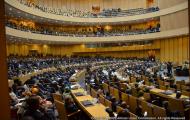Topic Resources
February 10, 2020
The present Report of the Peace and Security Council (PSC) of the African Union (AU) on its Activities and the State of Peace and Securit
February 10, 2020
Excellencies Heads of State and Government,
Honourable Ministers,
Invited Guests,
February 09, 2020
February 09, 2020
33rd SESSION OF THE AFRICAN UNION ASSEMBLY
09 FEBRUARY 2020
ADDIS ABABA, ETHIOPIA
February 10, 2022
Agenda 2063 is Africa’s development blueprint to achieve inclusive and sustainable socio-economic development over a 50-year period.
March 27, 2025
April 03, 2025





